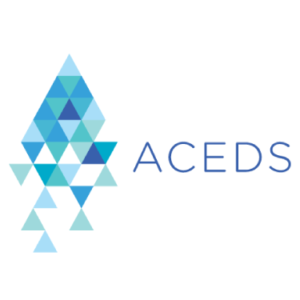eDiscovery Daily Blog
Here’s an ACEDS Houston CLE Event You Can Attend No Matter Where You Are: eDiscovery Education
In a normal non-COVID-19 (coronavirus) world, our chapter events for the Association of Certified E-Discovery Specialists (ACEDS) Houston chapter would in-person local events and probably limited to legal professionals in Houston and surrounding areas. But, we must adapt in the current (hopefully temporary) world of “social distancing”. As a result, here’s a CLE event that you can “attend”, even if you’re nowhere near Houston.
One week from today, on Thursday, April 2 at noon CST (1:00pm EST, 10:00am PST), ACEDS will host the webinar Mining for Valuable Data – Collection Fundamentals. In this one-hour webcast that’s CLE-approved for 0.75 hours in Texas, Paul Price, Vice President of Forensic Services at Xact Data Discovery will discuss collection fundamentals including: the scope of collection; how data is stored and recovered; the importance of metadata, forensic soundness and chain of custody; the risks of self-collection and other available collection approaches; and major source categories to be considered.
Let’s face it: While the left side of the EDRM (Identify, Preserve, and Collect) may be the least expensive part of the eDiscovery process, it can hold the biggest value because improper collections can result in having to repeat the entire process increasing the client’s total cost; sanctions can occur if the data is no longer available; and unnecessary legal battles may ensue to defend the decisions that were made at the beginning of the case. If you don’t have the time to do it right, when are you going to have the time to do it over?
You’re probably asking: If the webinar is CLE approved for 0.75 hours in Texas, how does that apply to me if I’m NOT in Texas? Well, based on CloudNine’s experience in hosting our own webcasts, we know that several states (and even one territory) offer reciprocal credit for approved CLE webinars in other states. Reciprocal credit may also be available in these states (and territory): Alaska, Arizona, Arkansas, California, Colorado, Florida, Hawaii, Maine, Montana, New Jersey, New York, North Dakota, Oregon, Puerto Rico, Rhode Island, Virginia, Washington, West Virginia and Wisconsin. And, these are the states we have confirmed will provide CLE credit – other states may as well (check with your local state bar on requirements in your state).
To get CLE credit in Texas after the webinar, email your name and bar number to me at my email address – daustin@cloudnine.com – and (once I confirm your attendance for the full 0.75 hours) I can record your credit for you. To get credit in another state, email me and (after confirming credit) I can send you a certificate so that you can pursue credit in your state. What could be easier than that?!?
BTW, don’t forget CloudNine’s next webcast – Winning the Battle on Discovery Form of Production – with Tom O’Connor and me on Thursday, April 2 at noon CST (1:00pm EST, 10:00am PST). That’s nearly 2 hours of new CLE courses in less than a week!
So, what do you think? Are you looking for opportunities to obtain CLE credit during the pandemic? Well, here’s one chance to do so! Please share any comments you might have or if you’d like to know more about a particular topic.

Sponsor: This blog is sponsored by CloudNine, which is a data and legal discovery technology company with proven expertise in simplifying and automating the discovery of data for audits, investigations, and litigation. Used by legal and business customers worldwide including more than 50 of the top 250 Am Law firms and many of the world’s leading corporations, CloudNine’s eDiscovery automation software and services help customers gain insight and intelligence on electronic data.
Disclaimer: The views represented herein are exclusively the views of the author, and do not necessarily represent the views held by CloudNine. eDiscovery Daily is made available by CloudNine solely for educational purposes to provide general information about general eDiscovery principles and not to provide specific legal advice applicable to any particular circumstance. eDiscovery Daily should not be used as a substitute for competent legal advice from a lawyer you have retained and who has agreed to represent you.

